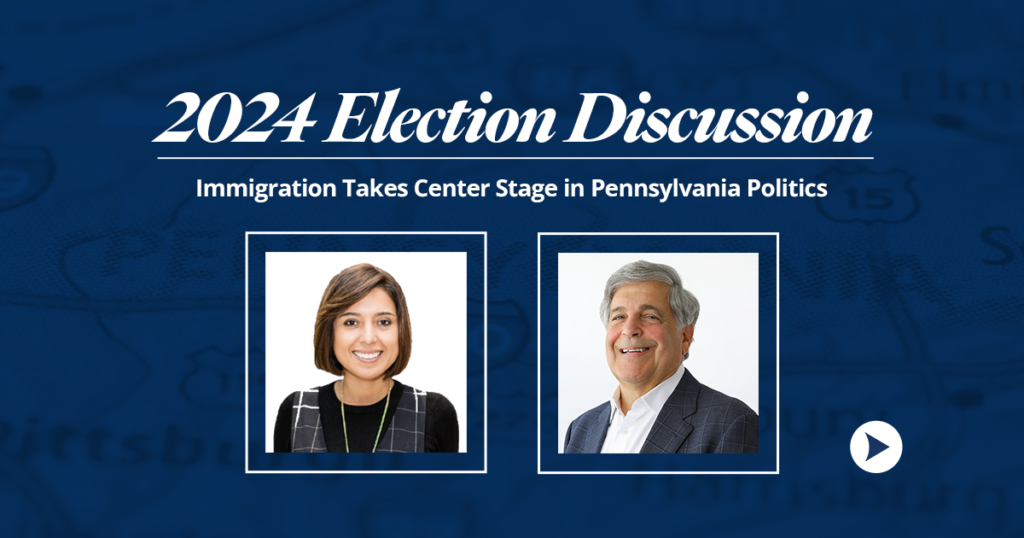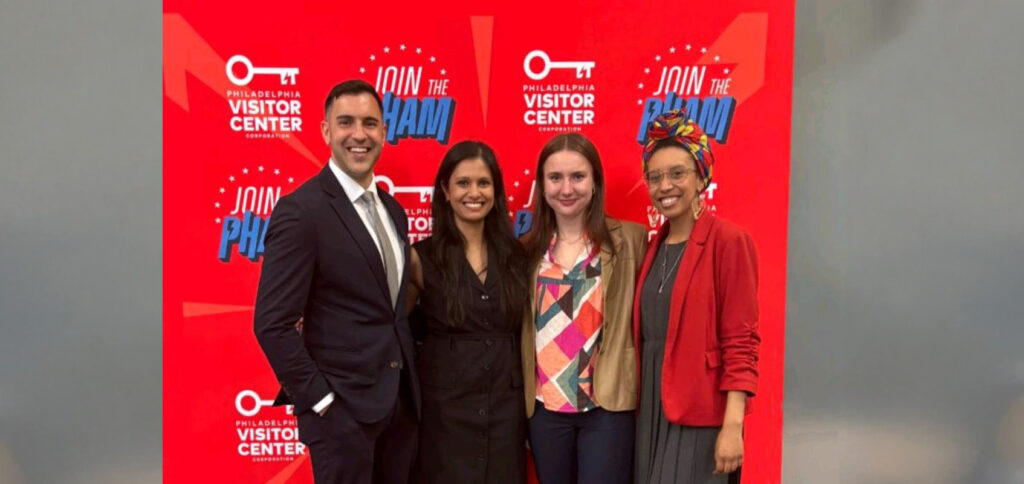
2024 Election Discussion: Immigration Takes Center Stage in Pennsylvania
Larry Ceisler recently had a conversation with Beatriz Lopez, Deputy Director for Immigration Hub. They discussed how immigration will impact races in PA at all levels of the ticket, and what Democrats need to do to reframe the conversation to effectively counter anti-immigrant rhetoric.
LC: So I’ve been seeing immigration becoming an issue at the state and local level in Pennsylvania in recent years. That’s unprecedented, especially since immigration is a federal issue and we’re not a border state. For example, State Representative Ryan McKenzie from the Lehigh Valley, who was always a pretty moderate guy, a Charlie Dent protege, took a hard anti-immigrant turn during his primary, which he won, to go up against Susan Wild, and that was a bit surprising to me.
BL: Yes, definitely. We see this in districts like this across the country where there are moderate Republicans that feel the need to go even farther right on immigration, to reach the Trump base voters.They do this in the primary, and then when they transition into the general, they don’t course correct or or feel the need that they have to adjust on this issue, and they find out that actually the general population, and especially in these close districts with lots of moderates, that actually people have much more of a sensible, pragmatic position on immigration. Yes, they believe in border security, but they’re not supportive of anti-immigrant policies. And they believe in a pathway to citizenship for people who have been here for many years. So that is sort of the important message that gets lost. And then you have folks like Susan Wild that actually have much more of a sensible, moderate position and they gain those votes.
LC: There’s been a lot of growth in the Latino population up in the Lehigh Valley, and it’s been attracting national coverage. And the Democrats need to be concerned about voting trends in a critical and growing demographic. So how salient of an issue is immigration among Latino voters, especially since so many of them have been established for so long in this country?
BL: Latinos have always been looking at immigration as one of their top three issues, and what they want to hear is that there’s actually something being done on the issue. They’re hearing from one side. But when they start hearing from Democrats on where they stand, it moves them. For example, when they hear that Democrats are for border security, but also a pathway to citizenship, it makes them more likely to vote Democrat. In fact, when we did our most recent polling, we found that over 60% of Latinos supported the executive actions that the Biden administration took that basically expands legal pathways for dreamers and undocumented spouses and children of US citizens, and the data shows that it motivates voters. This poll also shows that Latino voters were very motivated by these executive actions that the administration took once they heard about it, but there was also little awareness that these executive actions took place so that’s where the problem is.
LC: It’s interesting you say that because obviously, you know, we’re getting wall-to-wall ads here in Pennsylvania. I am seeing the Democratic ads now talking about immigration, but at the same time, we’re seeing lots of ads from the Republicans, from McCormick and Trump going after the Democrats on immigration. So how do you think it all jibes with your research, because they’re definitely starting to get competing messages. So you’re getting both sides of the issue now. So how do you see that working out?
BL: I think it’s great that Casey and other Democrats, including Vice President Harris, are going on offense on the immigration messaging because they weren’t before. There was this huge influx on the other side, where they’ve already I think spent nearly $100 million on anti-immigrant ads across battleground states. In Pennsylvania, you are obviously seeing a lot of that. So it’s good for Casey to go on offense and say, “Hey, look, this is where I stand on immigration,” as is Vice President Harris, whose recent ad was all about how strong she is on border security. And when you look at that ad, and what we see with Casey is that they’re hitting on the border solutions that have popular support, especially cracking down on fentanyl. I know in Pennsylvania, the opioid epidemic is a huge issue, and even though almost all the fentanyl comes in through legal ports of entry and has nothing to do with undocumented folks, talking about that is one way to show voters, that they’re taking the issue seriously, and, it responds to the attack fromRepublicans saying, “You’re letting criminals and drugs come to the border.” And so the other side has to respond to that by talking about border security, but also making sure that a pathway to citizenship is central to the message.
LC: It’s interesting in Pennsylvania, because again, we’re not a border state, but there’s been a recent history of anti-immigrant candidates here in PA. In 2018, Lou Barletta and Wagner lost badly doing the Trump rhetoric, then Biden beat Trump in 2020, in 2022, Doug Mastriano took a pretty hard line on immigration in the gubernatorial race against Josh Shapiro and he lost big. And Fetterman because of his history with the issue was able to beat Dr. Oz. So what does that tell you about Pennsylvania voters based on our history?
BL: So, what it says is that voters need to hear a message on immigration, and in Pennsylvania, we’ve spent a lot of time over six years in this state really trying to get to know voters there. Oftentimes what I see with voters is that you have the progressive base who needs to hear that aspirational message on immigration, but you have these swing voters in Pennsylvania that need to hear what Democrats are doing on immigration and not let the other side define them. I think Fetterman did an excellent job personalizing the issue. He said “immigration makes America, America,” and the images that you see when he did that ad, for instance, was very much his family, Pennsylvania, the workforce, and what it means to them in Pennsylvania, I think Fetterman is an incredible model on immigration messaging, and so is Shapiro, who wasn’t afraid to talk about how he defended Dreamers against Trump.
LC: So immigration is obviously a signature issue for Trump, and he’s going to continue to attack Harris and Walz on the issue. If you were giving recommendations to the Democrats on this, how would you message it in Pennsylvania?
BL: In Pennsylvania in particular, and what I would tell Harris and Walz is that a lot of the concern on immigration in PA is being driven by Republicans, and swing voters don’t have real knowledge about where Democrats stand on this issue, so this is an opportunity for Harris and Walz to go in there and talk about how they’re strong on border security and — it is so important, because we’ve seen it in our polling — how they are different from Trump in that they are committed to keeping families together and delivering a pathway to citizenship.
Harris and Walz need to say, “Yes, we will address the border and yes, we will address the age-old issue of the population that has been here for many years and without a legal pathway.” This kind of balanced approach has over 66% of support amongst battleground voters, including Pennsylvanians. An even stronger, more motivating message, is keeping American families together. We cannot go back to family separation. We cannot go back to banning people. We cannot allow a mass deportation policy to take over this country. So they have to be strong on the contrast and where they stand on immigration, and what can solve this issue once and for all.
LC: You know, I can remember when immigration really wasn’t an issue and certainly wasn’t a partisan issue. And you know, it’s probably been 10 years or so since a bipartisan comprehensive immigration reform almost passed into law. So, basically, what happened? Was it just Trump coming down the escalator and talking about Mexicans? What has it been in your mind?
BL: Well, it was actually even before he walked down that elevator in the 2016 campaign.
The Trump campaign really took advantage of social media and Facebook, and right-wing media as well. And what they did was be really disciplined on anti-immigrant messaging. Since then, they’ve invested millions upon millions of dollars on spreading this message. You add on what right-wing media does as well, and social media, you have this surround-sound anti-immigrant campaign and disinformation that’s reaching people all across the political spectrum.
LC: I remember back in 2018 when I went to get my haircut, and the barber would have Fox News on, and I remember all he talked about was “The caravans! The caravans!” And I was like, “What are you talking about?” and he’d say “They’re coming! They’re coming!” And as soon as the election was over, I never heard about it again.
BL: Yeah, that was part of the disinformation. That was the big mantra that Trump, and candidates like Wagner and Barletta, were saying in 2018. “Caravans are coming!” but caravans did not come.Instead, there were children separated from their mothers and fathers at the border. And that is why it’s so important for Democrats to not pivot away from the issue, but lean in, go on offense, because what’s at stake is not just whether we win the elections or not. It’s whether we actually fix this issue and also the many, many families who could be torn apart by the other side’s policies.
If Kamala Harris wins in 2024, you’ll have the aspirational message that it sends, but it also sends another message, which is that mass deportation and anti-immigrant messaging lost, and folks who are pragmatic will see that the Trump era has lost again. I hope that’s a wake-up call to say, look, that message isn’t working for us. We have to come to the table and be problem solvers on this issue, so I’m hoping that if everything works out the way that I hope it does, that we will be in a better position to come together and fix this problem once and for all.

Larry Ceisler is founder of Ceisler Media & Issue Advocacy



